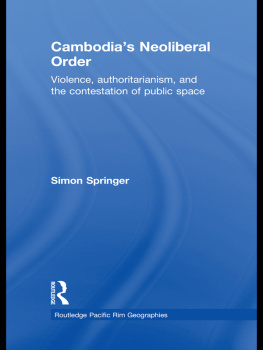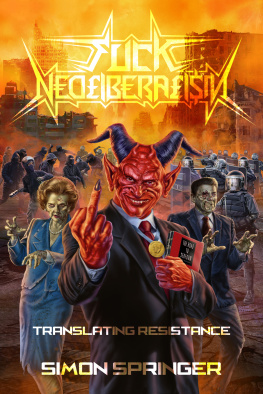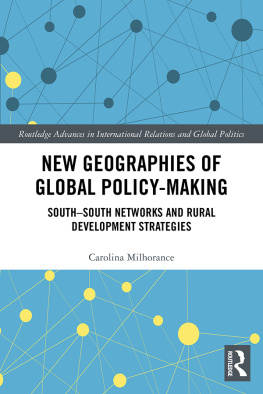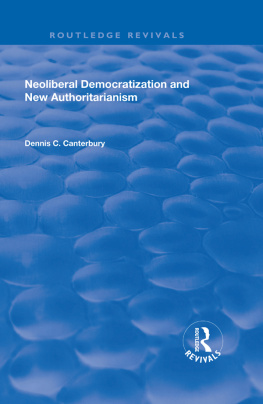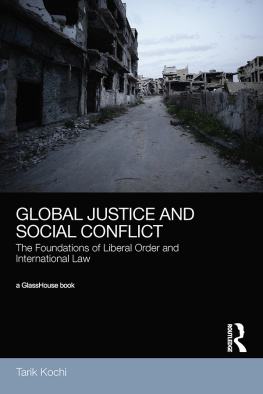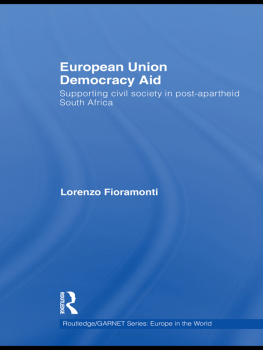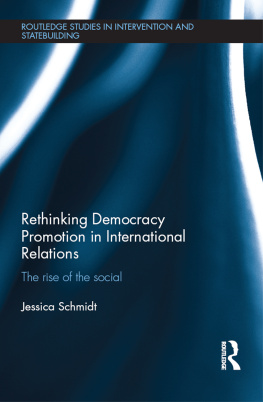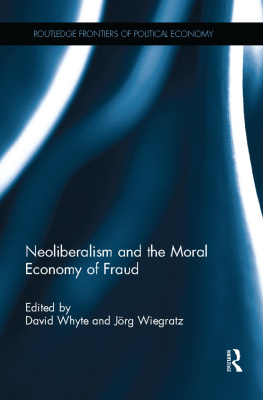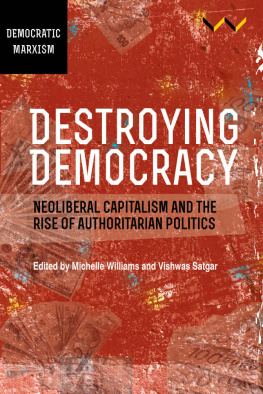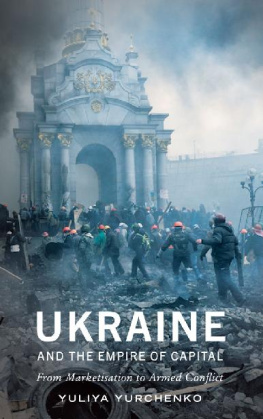Cambodias Neoliberal Order
Neoliberal economics have emerged in the post-Cold War era as the predominant ideological tenet applied to the development of countries in the Global South. For much of the Global South, however, the promise that markets will bring increased standards of living and emancipation from tyranny has been an empty one. Instead, neoliberalisation has increased the gap between rich and poor and unleashed a firestorm of social ills.
This book addresses the relationship between post-conflict geographies of violence, authoritarianism, and neoliberalisation in Cambodia. Applying a geographical analysis to contemporary Cambodian politics, the author employs notions of public space and radical democracy as the most substantive components of its theoretical edifice. He argues that the promotion of unfettered marketization is the foremost causal factor in the countrys inability to consolidate democracy following a United Nations-sponsored transition. The book demonstrates Cambodian perspectives on the role of public space in Cambodias process of democratic development and explains the implications of violence and its relationship with neoliberalism.
Taking into account the transition from war to peace, authoritarianism to democracy, and command economy to a free market, this book offers a critical appraisal of the political economy in Cambodia.
Simon Springer is Assistant Professor in the Department of Geography at the National University of Singapore. His ongoing research focuses on the intersections between neoliberalism and violence.
Routledge Pacific Rim geographies
Series Editors: John Connell, Lily Kong and John Lea
1. Landscapes of Globalization
Human geographies of economic change in the Philippines
Philip Kelly
2. Sex Work in Southeast Asia
The place of desire in a time of AIDS
Lisa Law
3. Urbanisation in the Island Pacific
Towards sustainable development
John Connell and John Lea
4. Malaysia, Modernity and the Multimedia Super Corridor
A critical geography of intelligent landscapes
Tim Bunnell
5. Made in the Philippines
Gendered discourses and the making of migrants
James A. Tyner
6. Environment, Development and Change in Rural Asia-Pacific
Between local and global
Edited by John Connell and Eric Waddell
7. Gated Communities in China
Privilege and the moral politics of the good life
Pow Choon-Piew
8. Cambodias Neoliberal Order
Violence, authoritarianism, and the contestation of public space
Simon Springer
Cambodias Neoliberal Order
Violence, authoritarianism, and the contestation of public space
Simon Springer

LONDON AND NEW YORK
First published 2010
by Routledge
2 Park Square, Milton Park, Abingdon, Oxon OX14 4RN
Simultaneously published in the USA and Canada
by Routledge
270 Madison Avenue, New York, NY 10016
Routledge is an imprint of the Taylor & Francis Group, an informa business
This edition published in the Taylor & Francis e-Library, 2010.
To purchase your own copy of this or any of Taylor & Francis or Routledges collection of thousands of eBooks please go to www.eBookstore.tandf.co.uk.
2010 Simon Springer
All rights reserved. No part of this book may be reprinted or reproduced or utilised in any form or by any electronic, mechanical, or other means, now known or hereafter invented, including photocopying and recording, or in any information storage or retrieval system, without permission in writing from the publishers.
British Library Cataloguing in Publication Data
A catalogue record for this book is available from the British Library
Library of Congress Cataloging-in-Publication Data
Springer, Simon.
Cambodias neoliberal order : violence, authoritarianism, and the
contestation of public space / Simon Springer.
p. cm.(Routledge Pacific Rim geographies ; 8)
Includes bibliographical references and index.
1. CambodiaPolitics and government. 2. CambodiaSocial
conditions. 3. CambodiaEconomic conditions.
4. NeoliberalismCambodia. 5. DemocracyCambodia.
6. Social conflictCambodia. I. Title.
JQ935.S67 2010
306.209596dc22 2009052576
ISBN 0-203-84896-9 Master e-book ISBN
ISBN 9780415568197 (hbk)
ISBN 9780203848968 (ebk)
For Om Savee
Contents
Political Map of Cambodia xii |
Tables
3.1 | Resistance to forest clearing |
3.2 | The constriction of the public sphere |
4.1 | Symptoms of a weak state |
4.2 | Forced evictions |
4.3 | The battle of homelessness |
4.4 | Freedom of assembly under fire |
4.5 | The legal chokehold on public opinion and information |
4.6 | Unionization and the contestation over labor exploitation |
4.7 | The struggle for land |
4.8 | Landscapes of protest |
Acknowledgments
Barry Riddell at Queens University showed remarkable faith in my abilities and his marvellous humor and careful guidance throughout the early stages of this process have been invaluable. My time at Queens was further enriched by many individuals, where John Holmes, Anne Godlewska, Audrey Kobayashi, Peter Goheen, Villia Jefremovas, Bruce Berman, Brendan Sweeney, and Sarah de Leeuw all stand out as having been instrumental in the conception and implementation of this project. Joan Knox, Kathy Hoover, Sharon Mohammed, and Sheila MacDonald all deserve recognition, not only for making me feel welcome in the department, but also for their help in cutting through all the red tape while I was overseas. My experience at Queens University would never have occurred if not for the fantastic people in the Geography department at UNBC. Gail Fondahl, Neil Hanlon, and Wim Kok provided much motivation and encouragement, while Catherine Nolin in particular has inspired me through her commitments to social justice in Central America and a genuine enthusiasm for learning.
Judy Ledgerwood and Steve Heder both offered invaluable input on this project at an early stage. I am grateful to both of them for sharing their experiences in Cambodia with the ethics committee and myself so that this project could take flight. Sorpong Peou and Caroline Hughes have also provided valuable comments and criticisms on my work over the last few years, and both are inspirational in their passion for Cambodian studies. In the later stages of this project, Philippe Le Billon, Jamie Peck, Jim Glassman, and Derek Gregory provided much encouragement, support, and critical feedback during my time at the University of British Columbia.

